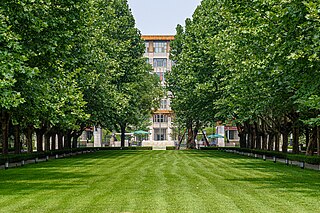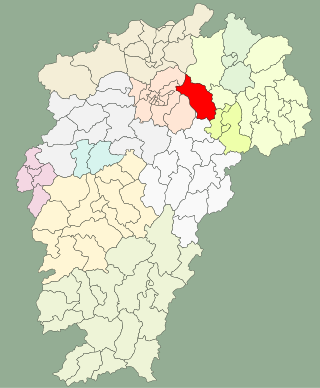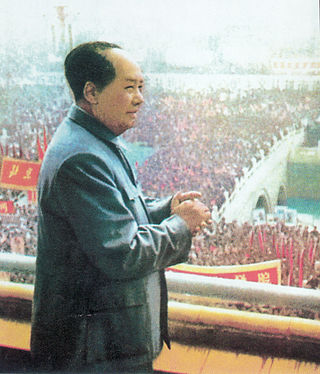This article needs to be updated.(March 2024) |


A cult of personality has been developing around Xi Jinping since he became General Secretary of the ruling Chinese Communist Party and the country's paramount leader in 2012. [1] [2] [3] [4]
This article needs to be updated.(March 2024) |


A cult of personality has been developing around Xi Jinping since he became General Secretary of the ruling Chinese Communist Party and the country's paramount leader in 2012. [1] [2] [3] [4]
After Deng Xiaoping started the Chinese economic reforms and introduced the concept of collective leadership in the late 1970s, there was no longer a cult of personality around Chinese leaders. Deng and others wanted to prevent another leader from rising above the party as Mao Zedong had done. [5] When Xi came to power in 2012, he started centralizing power and paved the way for a cult of personality. [6]
The Chinese Communist Party (CCP) has denied that there was any cult of personality. Xie Chuntao, director of the government-funded Central Party School's academic department, claimed the “respect and love” ordinary Chinese felt for Xi was “natural” and “heartfelt” and bore no similarities to a cult of personality. He added that memories of the excesses of Mao's cult were strong enough that the CCP would not allow another leader to form a cult around himself. [5] [7]
Since Xi assumed power in 2012, books, cartoons, pop songs and dance routines have honoured his rule. [8] In 2017, the local government of Jiangxi province told Christians to replace their pictures of Jesus with Xi Jinping. [9] [10] [11]
Writing in the Sydney Morning Herald , Philip Wen notes that “perhaps the most stunning characteristic shared with Mao has been a growing personality cult around Xi fanned by the central propaganda department, which has produced some jarring results: newspaper front-pages dominated by Xi's every move, saccharine music videos professing love and loyalty to the leader.” [12] In May 2016, just prior to the 50th anniversary celebration of Mao's Great Proletarian Cultural Revolution, a “Mao-themed revival show” at the Great Hall of the People featuring revolutionary “red songs” was designed to generate nostalgia for the Mao era, with “giant images of Mao and Xi projected on stage.” [12]
In March 2017, Xi claimed that he carried bags of 110 kilograms of wheat over 3 miles of mountain road without changing shoulder, [13] a feat deemed extraordinary [14] and broadcast by China Central Television during what was described as an image-crafting campaign. [14]
When he was re-elected in 2017, Xi dominated the front page of the People's Daily [lower-alpha 1] compared to previous editions, which emphasized a “collective leadership” model. [15]
The political ideology bearing his name, Xi Jinping Thought, was enshrined into the CCP's constitution in the 19th National Congress in October 2017 [16] and into the state constitution in 2018. [17] China Central Television (CCTV) also showed members of the National People's Congress "crying in happiness" because of Xi Jinping's re-election as president in 2018. [18]
Since October 2017, many universities across China have placed Xi Jinping Thought at the core of their curricula, the first time since Mao Zedong that a Chinese leader has been accorded similar academic stature. [19] Fudan University revised their charter to remove "academic independence and freedom of thought" and include a "pledge to follow the Communist party's leadership", leading to protests among the students. [20] [21] It also said that Fudan University had to “equip its teachers and employees” with Xi Jinping Thought, leading to concerns about the diminishing academic freedom of Fudan. [22] [23]
Former inmates in the Xinjiang internment camps claimed that they were forced to give thanks to the leader by chanting "Long live Xi Jinping." [24]
In October 2018, Hunan TV started airing a game show about Xi Jinping and his ideology. [25] In January 2019, Alibaba released a mobile app for studying Xi Jinping Thought named Xuexi Qiangguo . (The name of the app is a pun on Xi Jinping's name. Xuéxí can mean "learning" or "learn from Xi.") [26] [27] As of October 2019, it had more than 100 million active users, [28] and is now claimed to be the most downloaded item on Apple's domestic App Store, surpassing social media apps such as WeChat and TikTok (also known as Douyin in Mandarin). [29] [30]
Apps such as Toutiao, Tencent, and Sina have been forced to use what has been described as "a super algorithm", where the story at the top "has to be about Xi". [31] [32] There are souvenirs containing Xi Jinping's images throughout shops in China.[ citation needed ]

On 15 June 2020, Xi's birthday, Study Times , the media run by the Central Party School of the Chinese Communist Party, labelled Xi Jinping Thought as "21st Century Marxism". [33] It claimed that Xi Jinping Thought was the only scientific method to explain the Chinese Miracle in the 21st century. It also claimed to provide the "solution for the modern problems of humankind" and claimed that socialism was better than capitalism.[ citation needed ]
In October 2017, the CCP Politburo named Xi Jinping lingxiu ( 领袖 ), a reverent term for "leader" and a title previously only given to Chiang Kai-shek, Mao Zedong, and his immediate successor, Hua Guofeng. [34] [35] [36] He is also sometimes called the "Great Helmsman" (大舵手), [18] and in July 2018, Li Zhanshu, the Chairman of the Standing Committee of the National People's Congress, referred to Xi as the "eternal core" of the party. [37] On 25 December 2019, the politburo officially named Xi as "People's Leader" (人民领袖; rénmín lǐngxiù), a title only Mao held previously. [38]
In 2022, the 20th National Congress of the CCP added the "Two Establishes and Two Safeguards" into the Party's constitution, which established Xi as the "core" of the Central Committee and the CCP, and cemented his policies as guiding rules for the future of China. [39]

The Chinese Communist Party (CCP), officially the Communist Party of China (CPC), is the founding and sole ruling party of the People's Republic of China (PRC). Under the leadership of Mao Zedong, the CCP emerged victorious in the Chinese Civil War against the Kuomintang. In 1949, Mao proclaimed the establishment of the People's Republic of China. Since then, the CCP has governed China and has had sole control over the People's Liberation Army (PLA). Successive leaders of the CCP have added their own theories to the party's constitution, which outlines the party's ideology, collectively referred to as socialism with Chinese characteristics. As of 2023, the CCP has more than 98 million members, making it the second largest political party by membership in the world after India's Bharatiya Janata Party.

The General Secretary of the Central Committee of the Chinese Communist Party is the leader of the Chinese Communist Party (CCP), the sole ruling party of the People's Republic of China (PRC). Since 1989, the CCP general secretary has been the paramount leader of the PRC.
Paramount leader is an informal term for the most important political figure in the People's Republic of China (PRC). The paramount leader typically controls the Chinese Communist Party (CCP) and the People's Liberation Army (PLA), often holding the titles of CCP General Secretary and Chairman of the Central Military Commission (CMC). The state representative (president) or head of government (premier) are not necessarily paramount leader—under China's party-state system, CCP roles are politically more important than state titles.

Xi Jinping is a Chinese politician who has been the general secretary of the Chinese Communist Party (CCP) and chairman of the Central Military Commission (CMC), and thus the paramount leader of China, since 2012. Xi has also been the president of the People's Republic of China (PRC) since 2013. He belongs to the fifth generation of Chinese leadership.
The history of the People's Republic of China details the history of mainland China since 1 October 1949, when CCP chairman Mao Zedong proclaimed the People's Republic of China (PRC) from atop Tiananmen, after a near complete victory (1949) by the Chinese Communist Party (CCP) in the Chinese Civil War. The PRC is the most recent political entity to govern mainland China, preceded by the Republic of China and thousands of years of monarchical dynasties. The paramount leaders have been Mao Zedong (1949–1976); Hua Guofeng (1976–1978); Deng Xiaoping (1978–1989); Jiang Zemin (1989–2002); Hu Jintao (2002–2012); and Xi Jinping.

Deng Xiaoping Theory, also known as Dengism, is the series of political and economic ideologies first developed by Chinese leader Deng Xiaoping. The theory does not reject Marxism–Leninism or Maoism, but instead claims to be an adaptation of them to the existing socioeconomic conditions of China.
The mass line is the political, organizational and leadership method developed by Mao Zedong and the Chinese Communist Party (CCP) during the Chinese Communist Revolution. It refers to formulating policy based on theory, implementing it based on people's real world conditions, revising theory and policy based on actual practice, and using that revised theory as the guide to future practice. In Maoist terms, it is summarized by the phrase, "To the masses - from the masses - to the masses".

The CentralParty School of the Chinese Communist Party, officially the Party School of the Central Committee of the Communist Party of China and commonly known as the Central Party School (中央党校), is the higher education institution which trains Chinese Communist Party (CCP) cadres. It is located in Haidian, Beijing, close to the Old Summer Palace and Summer Palace.

Wang Huning is a Chinese political theorist and one of the top leaders of the Chinese Communist Party (CCP), who is currently the chairman of the Chinese People's Political Consultative Conference (CPPCC). He has been a leading ideologist in the country since the 1980s. He has been a member of the CCP's Politburo Standing Committee, China's top decision-making body since 2017, and is its fourth-ranking member since 2022.
The history of the Chinese Communist Party began with its establishment in July 1921. A study group led by Peking University professors Chen Duxiu and Li Dazhao to discuss Marxism, led to intellectuals officially founding the Chinese Communist Party (CCP) in July 1921. In 1923, Sun Yat-sen invited the CCP to form a United Front, and to join his Nationalist Party (GMD) in Canton for training under representatives of the Communist International, the Soviet Union's international organization. The Soviet representatives reorganized both parties into Leninist parties. Rather than the loose organization that characterized the two parties until then, the Leninist party operated on the principle of democratic centralism, in which the collective leadership set standards for membership and an all-powerful Central Committee determined the party line, which all members must follow.

Yugan County is a county in the north of Jiangxi province, People's Republic of China, containing part of the southern end of Poyang Lake. It is the westernmost county-level division of the prefecture-level city of Shangrao.

Li Rui was a Chinese politician, historian and dissident Chinese Communist Party (CCP) member.
The succession of power in China since 1949 takes place in the context of a one-party state under the Chinese Communist Party (CCP). Despite the guarantee of universal franchise in the constitution, the appointment of the Paramount leader lies largely in the hands of his predecessor and the powerful factions that control the Central Committee of the Chinese Communist Party.

The President of the People's Republic of China, commonly called the President of China, is the state representative of the People's Republic of China, which on its own is a ceremonial office and has no real power in China's political system. However, since 1993, the post has been held by the general secretary of the Chinese Communist Party (CCP) and chairman of the Central Military Commission, who is China's de facto leader.
In modern Chinese politics, a leadership core or core leader refers to a person who is recognized as central to the leadership of the Chinese Communist Party (CCP). Four individuals so far have been given this designation: Mao Zedong, Deng Xiaoping, Jiang Zemin, and Xi Jinping. The leader of the fourth generation, Hu Jintao, has never been referred to as core throughout his term as General Secretary. The designation is not a formal title and does not hold legal weight, but its use in official party documentation gives its holder a precisely defined place in theory on their relative standing to the rest of the CCP leadership. The leadership core operates as part of the Leninist concept of democratic centralism, and is intended to represent a vital center rather than a hierarchical peak, which differentiates it from the role of paramount leader. Although all core leaders have also been paramount leaders, not all paramount leaders are or have been designated 'leadership core'.

Xi Jinping Thought on Socialism with Chinese Characteristics for a New Era, commonly abbreviated outside China as Xi Jinping Thought, is an ideological doctrine created during General Secretary Xi Jinping's leadership of the Chinese Communist Party (CCP) that combines Chinese Marxism and national rejuvenation. According to the CCP, Xi Jinping Thought "builds on and further enriches" previous party ideologies and has also been called as the "Marxism of contemporary China and of the 21st century". The theory's main elements are summarized in the ten affirmations, the fourteen commitments, and the thirteen areas of achievements.

Xuexi Qiangguo is a Chinese mobile app primarily designed to teach Xi Jinping Thought. It is designed by Alibaba Group. As of October 2019, it has more than 100 million active users and was the most downloaded item on Apple's domestic App Store, surpassing social media apps such as WeChat and TikTok, before being overtaken by the National Anti-Fraud Center app, an anti-fraud educational app.

Mao Zedong's cult of personality was a prominent part of Chairman Mao Zedong's rule over the People's Republic of China from the state's founding in 1949 until his death in 1976. Mass media, propaganda and a series of other techniques were used by the state to elevate Mao Zedong's status to that of an infallible heroic leader, who could stand up against the West, and guide China to become a beacon of communism.
Historical nihilism is a term used by the Chinese Communist Party (CCP) and some scholars in China to describe research, discussions, or viewpoints deemed to contradict an official state version of history in a manner perceived to question or challenge the legitimacy of the CCP. The CCP opposes historical interpretations that are critical of it, the People's Liberation Army, socialism, and related topics. Viewpoints that the state judges to be historical nihilism are subject to censorship and legal prosecution.

The Resolution of the CPC Central Committee on the Major Achievements and Historical Experience of the Party over the Past Century, commonly known as the "third historical resolution", is a document adopted by the 19th Central Committee of the Chinese Communist Party (CCP) on its Sixth Plenary Session held between 8–11 November 2021. This document was the third of its kind after "historical resolutions" adopted by Mao Zedong and Deng Xiaoping.
A video circulating this week showed students at Shanghai's Fudan University singing the school song – which extols "academic independence and freedom of thought" – in an apparent protest.{...}Besides removing "freedom of thought", the ministry adds to the charter "arming the minds of teachers and students with Xi Jinping's new era of socialist ideology with Chinese characteristics". It also obliges faculty and students to adhere to "core socialist values" and build a "harmonious" campus environment – a code phrase for the elimination of anti-government sentiment.
The state also imposes what I call "a super algorithm" on these platforms – the story at the very top of every news website and news app has to be about Xi Jinping.